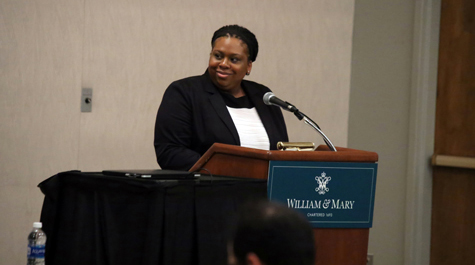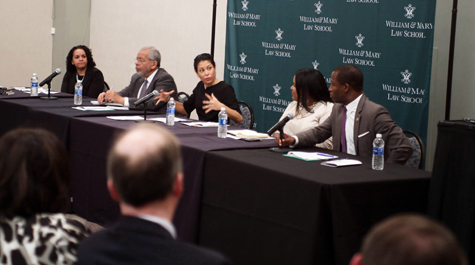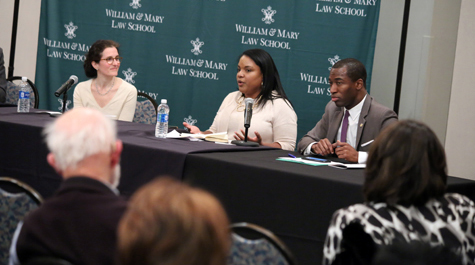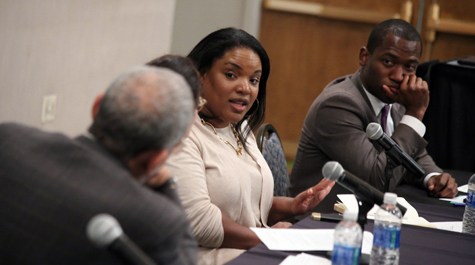Annual BLSA Symposium Explores Theme of Systematic Suppression
William & Mary’s Black Law Students Association hosted its annual symposium concerning issues on Race and the Law on February 25, 2016. Titled “Systematic Suppression: Mass Incarceration and Voter Disenfranchisement,” the event featured lively panel-style discussion between established experts in the field.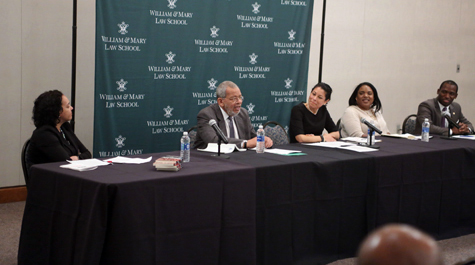
Held in the Sadler Center’s Tidewater Room, the event was co-sponsored by the William & Mary Election Law Society, the Center for Student Diversity, The Lemon Project, the Mason School of Business, Revive My Vote, and the Office of Diversity and Equal Opportunity.
Students, faculty, and staff from the Law School, the School of Business, and the College of William & Mary filled the event to hear the discussion between panelists.
Panelists for the symposium included David Baugh, established criminal defense expert for death penalty defendants; Andrea James of Families for Justice as Healing; Nicole D. Porter of the Sentencing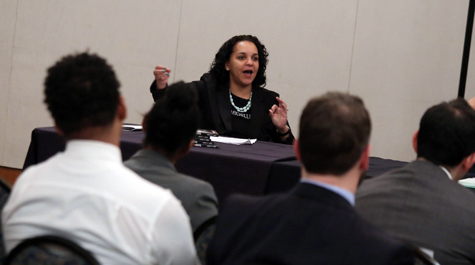 Project; and Levar Stoney, Secretary of the Commonwealth of Virginia. Professors Vivian E. Hamilton and Rebecca Green of William & Mary Law School partnered to moderate the panel discussion.
Project; and Levar Stoney, Secretary of the Commonwealth of Virginia. Professors Vivian E. Hamilton and Rebecca Green of William & Mary Law School partnered to moderate the panel discussion.
In opening remarks, Brittany McGill J.D. ’17 introduced the panelists and the continuing importance of the symposium’s themes--mass incarceration and voter disenfranchisement--to the goals of equality and opportunity across the nation. Todd Mooradian, Associate Dean for Faculty & Academic Affairs for the Mason School of Business, then praised the panel’s ability to “challenge assumptions and pre-conceptions” about the role of race in the American legal and political systems.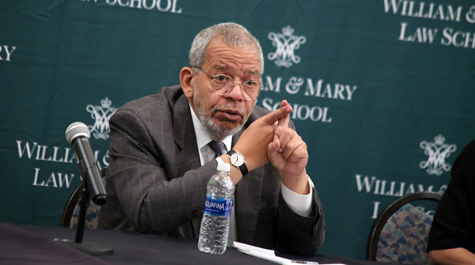
The first hour focused on the disparate impacts and wide-ranging effects of mass incarceration upon minorities. Baugh cited the astonishing statistic that while the number of incarcerated was a mere 300,000 when he began to practice law in 1975, today the number of incarcerated exceeds 2.5 million. Porter noted the increasingly political nature of the choice to resort to incarceration, remaking that it is a “fundamentally political choice to respond to crime by increased incarceration.”
The panel also noted the disparity of state spending between education and corrections, with the Commonwealth of Virginia spending $1.5 billion per year on corrections and by comparison only $1 billion on education.
During the second hour, the panelists explored the history and present affairs regarding voter disenfranchisement. Green established the tone of the panel by examining the various forms of modern disenfranchisement and strategies to address the continuing systematic problems.
Stoney commented on the continuing effects of minority disenfranchisement, stating that “Jim Crow still lives in Virginia’s laws today.” He went on to detail the developing efforts in Virginia to remove both financial and social barriers to restoring the right to vote to minority voters. 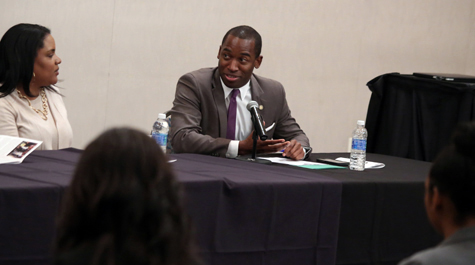
Attendees asked questions regarding the long-term effects of mass incarcerations on minorities, education within the prison system, and restoring the franchise to minority voters who encounter significant obstacles. The panel expressed a positive outlook in their answers, urging attendees to take ownership of these vital issues and foster discussions with classmates and colleagues to precipitate tangible changes.
Members of the panel, most notably Baugh and Porter, repeatedly encouraged those who attended the event to invest themselves in the ongoing fight to achieve equality. Attendees noted the event’s emphasis on immediate involvement and challenging discussions on the topics presented on race in the modern American nation.
About William & Mary Law School
Thomas Jefferson founded William & Mary Law School in 1779 to train leaders for the new nation. Now in its third century, America's oldest law school continues its historic mission of educating citizen lawyers who are prepared both to lead and to serve
